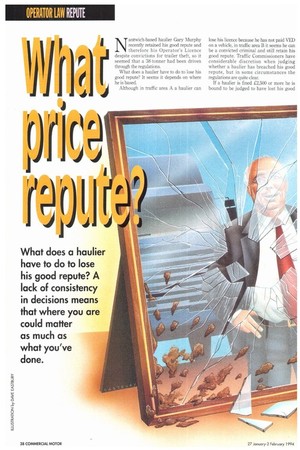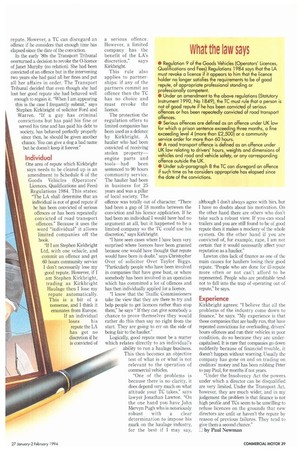What does a haulier have to do to lose his
Page 40

Page 41

If you've noticed an error in this article please click here to report it so we can fix it.
good repute? A lack of consistency in decisions means that where you are could matter as much as what you've done.
Nantwich-based haulier Gary Murphy recently retained his good repute and therefore his Operator's Licence desp.te convictions for trailer theft, so it seemed that a 38-tonner had been driven through the regulations.
What does a haulier have to do to lose his good repute? It seems it depends on where he is based.
Although in traffic area A a haulier can
lose his licence bemuse he has not paid VED on a vehicle, in traffic area B it seems he can be a convicted criminal and still retain his good repute. Traffic Commissioners have considerable discretion when judging whether a haulier has breached his good repute, but in some circumstances the regulations are quite clear.
If a haulier is fined £2,500 or more he is bound to be judged to have lost his good repute. However, a IC can disregard an offence if he considers that enough time has elapsed since the date of the conviction.
In the early '80s the Transport Tribunal overturned a decision to revoke the 0-licence of Janet Murphy (no relation). She had been convicted of an offence but in the intervening two years she had paid all her fines and put all her affairs in order. The Transport Tribunal decided that even though she had lost her good repute she had behaved well enough to regain it. When I am appearing this is the case I frequently submit," says Stephen Kirkbright of solicitor Ford and Warren. "If a guy has criminal convictions but has paid his fine or served his time and has paid his debt to society, has behaved perfectly properly since then, he should be given another chance. You can give a dog a bad name but he doesn't keep it forever."
Individual One area of repute which Kirkbright says needs to be cleared up is an amendment to Schedule 6 of the Goods Vehicles (Operators' Licences, Qualifications and Fees) Regulations 1984, This states: "The LA shall determine that an individual is not of good repute if he has been convicted of serious offences or has been repeatedly convicted of road transport offences." Because it uses the word "individual" it allows limited companies off the hook.
"If I am Stephen Kirkbright Ltd, with one vehicle, and commit an offence and get 60 hours community service I don't necessarily lose my good repute. However, if I am Stephen Kirkbright, trading as Kirkbright Haulage then I lose my repute automatically. This is a bit of a nonsense, and I think it emanates from Europe. If an individual
loses his repute the LA has got no discretion if he is convicted of a serious offence. However, a limited company has the benefit of the LA's discretion," says Kirkbright.
This rule also applies to partnerships: if any of the partners commit an offence then the IC has no choice and must revoke the licence.
The protection the regulation offers to limited companies has been used as a defence by Kirkbright. A haulier who had been convicted of receiving stolen property— engine parts and tools—had been sentenced to 90 hours community service. The haulier had been in business for 25 years and was a pillar of local society. The offence was totally out of character. "There had been a gap of 18 months between the conviction and his licence application. If he had been an individual I would have had no argument at all, but it happened to be a limited company so the -rc could use his discretion," says Kirkbright.
"I have seen cases where I have been very surprised where licences have been granted because one would have thought that repute would have been in doubt." says Christopher Over of solicitor Over Taylor Biggs. "Particularly people who have been involved in companies that have gone bust, or where somebody has been involved in an operation which has committed a lot of offences and has then individually applied for a licence.
"I know that the Traffic Commissioners take the view that they are there to try and help people to get licences rather than stop them," he says "If they can give somebody a chance to prove themselves they would rather do this than say no right from the start. They are going to err on the side of being fair to the haulier."
Logically, good repute must be a matter which relates directly to an individual's ability to run a haulage business.
This then becomes an objective test of what is or what is not relevant to the operation of commercial vehicles.
"One of the problems is because there is no clarity, it does depend very much on what attitude your IC takes," says lawyer Jonathan Lawton. "On the one hand you have John Mervyn Pugh who is notoriously robust with a clear determination to impose his mark on the haulage industry, for the best if I may say, although I don't always agree with him, but I have no doubts about his motivation. On the other hand there are others who don't take such a robust view. If you can steal trailers and you are still found to be of good repute then it makes a mockery of the whole system. On the other hand if you are convicted of, for example, rape, I am not certain that it would necessarily affect your reputation as a haulier."
Lawton cites lack of finance as one of the main causes for hauliers losing their good repute. "People who are done for ill-repute more often or not can't afford to be represented. People who are profitable tend not to fall into the trap of operating out of repute," he says.
Experience
Kirkbright agrees: "I believe that all the problems of the industry come down to finance," he says. "My experience is that those companies that are badly run, that have repeated convictions for overloading, drivers' hours offences and run their vehicles in poor condition, do so because they are undercapitalised. It is rare that companies go down suddenly because of financial trouble, it doesn't happen without warning. Usually the company has gone on and on trading on creditors' money and has been robbing Peter to pay Paul, for months if not years.
"Under the Insolvency Act the powers under which a director can be disqualified are very limited. Under the Transport Act, however, they are much wider, and in my judgement the problem is that finance is not high profile and TCs seem to be unwilling to refuse licences on the grounds that new directors are unfit or haven't the repute by reason of previous failures. They tend to give them a second chance."
by Paul Newman




















































































